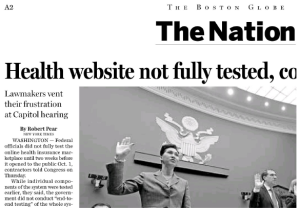
This article was previously published at WGBH News.
John Henry has some explaining to do to the people of Central Massachusetts. According to the Telegram & Gazette of Worcester, a paper that Henry acquired along with The Boston Globe last year, Henry may be preparing to sell the T&G to Halifax Media Group, a chain based in Daytona Beach, Fla. Halifax owns 35 daily papers, mainly in the Southeast.
Rick Edmonds, who analyzes the news business for the Poynter Institute, writes, “Halifax’s way of operating remains mysterious but appears typically to involve newsroom layoffs and a booster-ish editorial tone.” Edmonds’ article is recommended reading, as it has a lot of details about Halifax and its competitors in the community-newspaper business — including GateHouse Media, which owns about 100 papers in Eastern Massachusetts.
The idea that Henry might sell the T&G to an out-of-state chain with a penchant for cost-cutting is alarming. But would he really do it? Back in November, he met with the T&G staff and said his preference was to sell to local owners — and that if such owners didn’t materialize, he might keep the paper. Here’s some of what T&G reporter Lisa Eckelbecker reported on Nov. 26 about Henry’s visit:
“I think it’s important for the Telegram & Gazette to be under local ownership,” he [Henry] told a gathering of the newspaper’s staff in the newsroom Tuesday afternoon. “I have been talking to local people who have expressed an interest. There’s absolutely nothing imminent.”
Mr. Henry told the newspaper’s employees that a potential sale would not happen until 2014 and that it would only be to the “right buyer.”
“I think you need a local owner,” he said. “A local owner can sit down with advertisers, readers and community leaders and ask for their support. I’m looking for someone with tremendous energy and a passion for this newspaper.”
Mr. Henry also said that if he cannot find the right owner, he would keep the T&G.
“This is not a forced sale,” he said. “If we don’t find the right owner, you’re stuck with me.”
In March, the T&G’s Shaun Sutner reported that the chances of a sale to local ownership had all but evaporated, as a group led by retired T&G editor Harry Whitin and Polar Beverages chief executive Ralph Crowley had taken itself out of the running. But Henry, rather than reasserting his love for Worcester and its environs, has apparently been quietly pushing ahead with a possible sale.
Now, a couple of caveats. First, just because Halifax executives are nosing around the T&Gdoesn’t mean that Henry would sell to them. Let’s not forget that the New York Times Co. let the truly alarming “Papa Doug” Manchester of U-T San Diego kick the tires on the Globe, but in the end handcrafted a deal that allowed Henry to take charge. Perhaps Henry will do something similar now that the situation has been reversed.
In addition, even if Halifax did acquire the T&G, we don’t really know what kind of a steward it would be. Virtually all newspaper companies lay people off when they acquire a new property. The real issue is whether they cut so deeply that their papers are no longer able to fulfill their journalistic mission. According to Edmonds, Halifax’s papers still engage in investigative journalism; its largest paper, the Sarasota Herald-Tribune, won a Pulitzer in 2011 (although that predated the paper’s 2012 acquisition by Halifax).
Still, there’s little question that the Telegram & Gazette would be better off in the hands of local owners. Given that the paper’s reported value is just $7 million, it would be nice to think that the local owner might prove to be John Henry himself.
Photo (cc) by Terageorge and published under a Creative Commons license. Some rights reserved.






